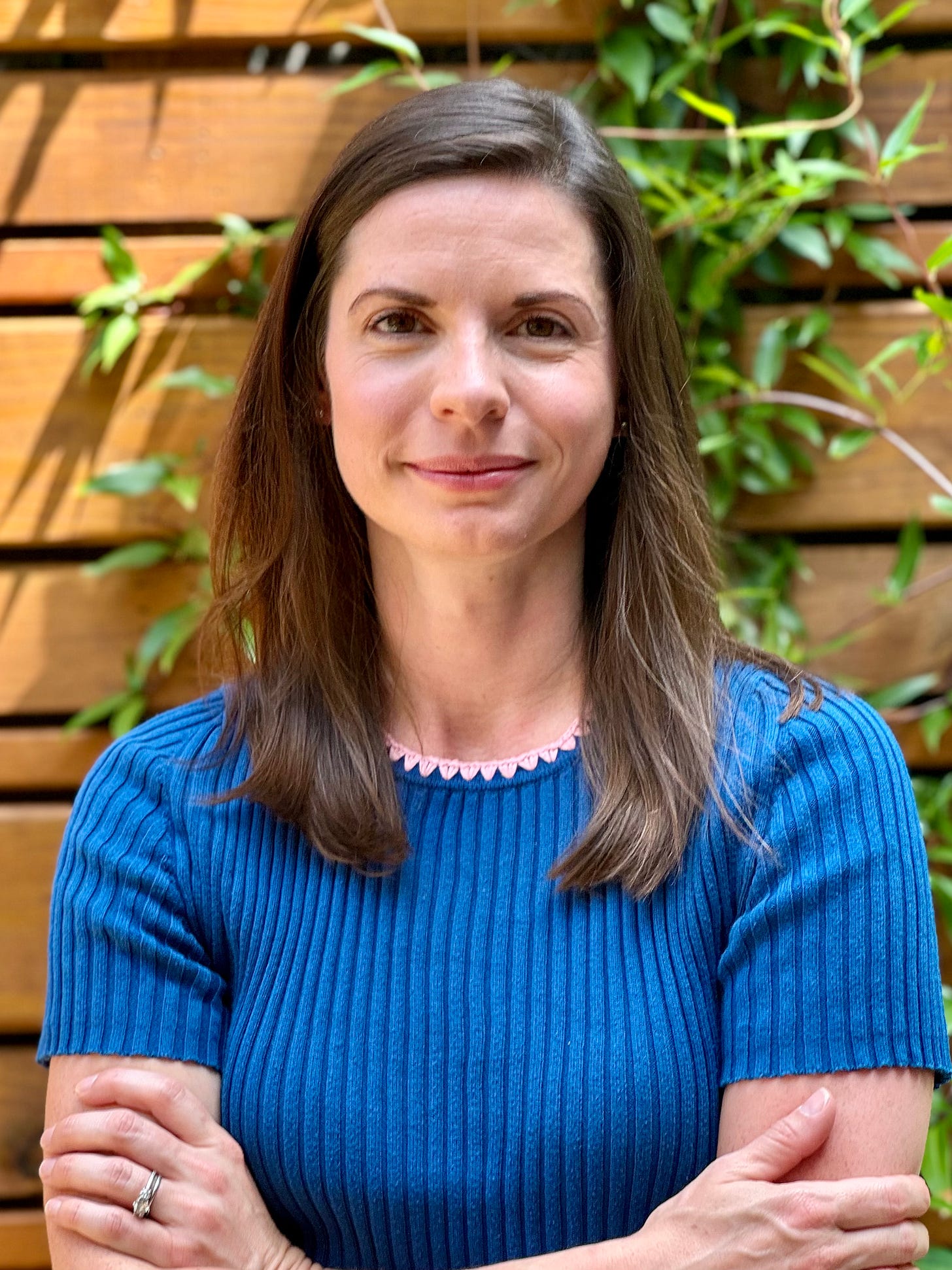The BHR Group Digital Rights Careers Newsletter - Issue 23
Dear Colleagues:
The stakes are so high and the issues so urgent and abundant in the field of technology and human rights that day-to-day work can sometimes crowd out time to steadily learn and build on prior experiences. In the Q&A with our guest practitioner – Katie Shay, Director of Human Rights at Cisco – you’ll see a throughline of thoughtful, grounded, and purpose-driven learning on human rights topics, all of which informs Katie’s approach to leadership in this field.
Some of the learning comes from engaging with peers and mentors, and that includes gathering ideas and lessons from business and human rights challenges beyond just the technology sector. Some of the learning is from actively studying the latest technology, policy, law, and human rights issues, including through academic literature, working groups, newsletters, podcasts, and more. Much of the learning of course comes directly from Katie’s years of experience navigating human rights issues in various roles inside civil society, business, and within a multi-stakeholder initiative in this field.
The key from all the learning, however it’s pursued, is to turn the lessons into principled and practical leadership. You’ll see in the interview that Katie reflects regularly on how prior experiences should inform today’s decisions. You’ll learn too that she focuses not only on the substance of policy and law questions but also on the art and science of building teams and systems of collaboration and teamwork that support responsible decision-making on technology and human rights issues.
Read the Q&A to get more insights from Katie on practicing in this field. Thank you Katie for your ongoing leadership!
Michael Samway
The Business and Human Rights Group
Website: www.thebhrgroup.com
Guest Spotlight: Katie Shay
Katie Shay is the Director of Human Rights at Cisco Systems, Inc., where she leads initiatives to promote and respect human rights across the company's global operations. Katie and her team are responsible for developing and implementing Cisco’s human rights policies, ensuring compliance with international standards, and advocating for responsible business practices. Katie has worked in the business & human rights field for over a decade. Before joining Cisco, Katie served as a Senior Legal Counsel, Business and Human Rights at Yahoo and as Legal & Policy Coordinator at the International Corporate Accountability Roundtable (ICAR).
Katie collaborates closely with respected business & human rights organizations like Article One, BSR, and UN B-Tech, and represents Cisco in influential forums such as RightsCon and at the United Nations.
She resides in Durham, NC, with her husband Matt and their two children, ages 4 and 2.
What are some of the most formative period or events in your life, personal or professional, that shaped your work in technology and human rights?
Before I knew what “business & human rights” was, I interned at the Brady Center to Prevent Gun Violence. I worked on cases against gun dealers that negligently sold firearms to people who were legally prohibited to possess them, with tragic consequences for families, often due to domestic violence. This was an incredibly formative experience for me. It clearly demonstrated the critical importance of companies conducting due diligence when their business activities could result in harm. While the specifics of my current work are different, the underlying principles remain the same.
A few years after that internship, the United Nations Human Rights Council unanimously endorsed the Guiding Principles on Business and Human Rights (UNGPs), outlining the corporate responsibility to respect human rights. Among other things, this includes the responsibility to conduct human rights due diligence to identify, prevent, mitigate, and account for human rights risks. My career has been dedicated to implementing the UNGPs in both public and corporate policies.
In the 12 years that you’ve been doing this work, what has changed?
When I started in this field back in 2011, the UNGPs had just been adopted but there were already discussions among the NGOs I worked with about pushing for mandatory human rights due diligence legislation to require companies to identify, address, and report on human rights risks associated with their supply chains and business operations. It has been a long journey, but that legislation is now on the books in several countries and the EU recently adopted the Corporate Sustainability Due Diligence Directive, which will move this work forward significantly.
Today, as an in-house human rights attorney, I’m noticing a shift among industry from being very focused on promoting best practices (at least among the companies that are leading on these issues) to more of a compliance focus. I now lead a team that is both focused with managing Cisco’s compliance with human rights regulations, as well as with partnering throughout the business to drive best practice in managing risks in our supply chain and other business relationships, as well as in our own operations. Overall, I believe the legislation is a very good thing in that it will bring laggards along and level the playing field. But I will always find the “best practice” elements of this work to be the most interesting and gratifying.
How do you continue doing what you do, pushing and advocating for digital rights, and human rights more broadly? (How do you deal in a sustainable way for yourself with the frustrations or set-backs in this work and also acknowledge and build-on the progress?)
When I was on the Global Network Initiative (GNI) Board, one principle that was consistently emphasized was the importance of continuous improvement in corporate practices to respect human rights. This philosophy has deeply influenced my approach at Cisco. I am incredibly proud of what our team has accomplished in just a few short years, yet I recognize that we are on an ongoing journey to further mature our program.
I frequently remind myself of that GNI maxim: progress over time. Both the Business and Human Rights (BHR) field and the tech industry are in a constant state of evolution, and there is always more to learn. This perspective helps me manage my desire to be further along in our maturity journey. Instead, I focus on keeping our north star in focus while fostering a culture of continuous learning and improvement.
Who are some people or an individual you’ve met during your work in this field who have/has had profound influence on your work? And in what way?
Amol Mehra hired me for my first paid role in the business and human rights (BHR) space. Working alongside him to build the International Corporate Accountability Roundtable (ICAR) was an invaluable experience. As the second employee at ICAR, I was entrusted with leading our “Access to Remedy” research and policy work, managing our budget, hiring and training new staff, coordinating a coalition of NGOs around policy strategies, and planning workshops and conferences for the coalition. It was challenging yet gratifying work, and we had a lot of fun doing it. This role not only deepened my expertise in BHR but also equipped me with essential leadership skills, such as team management and budget oversight.
I have been fortunate to have several mentors throughout my career, including Anita Ramasastry and Gwynne Skinner (of blessed memory). Early in my career, I was very committed to doing human rights work at NGOs. When I asked Anita and Gwynne for feedback on how I could continue to grow and become more effective in my role, both encouraged me to explore roles in government or the private sector. A particularly memorable conversation with Anita over a glass of wine at the UN Forum one year opened my mind and ultimately led to my decision to accept a position at Yahoo. During that conversation, Anita suggested that working at a corporation would be a valuable way to learn about how businesses make decisions, which would enhance my effectiveness as an advocate in the long run. It turns out that I actually love working in-house and feel more effective in this type of role than I did in civil society.
What are some of the sources you turn to when building knowledge or keeping informed on tech, policy, law, and human rights related issues?
These days, many of the issues we tackle are making headlines. Besides mainstream news sources, I get a lot of my information from specialized newsletters like this one, the Business & Human Rights Resource Center, and the Access Now newsletter.
I’m also actively involved in industry groups such as the Article One Roundtable on Human Rights & AI, the BSR Human Rights Working Group, and UN B-Tech. These groups are fantastic for learning from my peers and sharing what we’re working on at Cisco to help improve industry practices.
Podcasts are another great resource for me. I particularly enjoy "Frankly Speaking," hosted by former MEP Richard Howitt, which covers traditional BHR issues and the new mandatory human rights and environmental regulations coming out of Europe. I also regularly tune into "Marketplace Tech," "TechTank" by the Brookings Institute, and the "Lawfare" podcast to stay updated on the latest trends and discussions in technology and human rights.
What’s something you didn’t expect in work in this field?
As I mentioned earlier, I never expected to enjoy working at a company as much as I do, so it was a pleasant surprise to discover how much I love in-house work. I'm passionate about good decision-making, and I see my role as helping our company leaders make the best possible decisions by highlighting human rights risks and strategies to address them. I also appreciate the opportunity for "quick wins." There's nothing more gratifying than collaborating with a product manager or policy owner to implement an improvement that can have a significant impact on society, given the vast number of people who interact with our products daily.
Another unexpected aspect of this work is how collaborative it is. Early in my career, the relationship between companies and civil society often felt adversarial. Over time, I think we've all realized that we achieve more by working together and learning from each other. Two individuals who have really exemplified this collaborative spirit for me are Greg Nogeim at the Center for Democracy and Technology and Arvind Ganesan at Human Rights Watch. I can think of numerous examples of times that Greg or Arvind has helped me see a way to improve corporate practice or to be more transparent, and they’ve always done so with tremendous respect and kindness.
Finally, I didn’t expect to meet my husband through this work! We became fast friends after meeting at a Global Network Initiative meeting in 2015. Now, almost 10 years later, we are married and raising two children (ages 4 and 2) who are already showing signs that they’ll be excellent advocates, policymakers, and coalition builders. Negotiating “snack policy” with a four-year-old has definitely honed my skills!
Positions in Policy, Law, and Digital Rights
Civil Society/Non-Profits
Asia Pacific Policy Analyst/Counsel (Southeast Asia) | Access Now (Multiple Locations)
Equity in Civic Technology Fellow | Center for Democracy & Technology (Washington D.C.)
Senior Technical Fellow | Democracy International (Maryland)
Foundation Executive Director | Eticas (Remote)
Female Edtech Fellowship | European Edtech Alliance
Digital Security Training Intern | Freedom of the Press Foundation (New York, Remote)
Director, Social Trust Initiative | The Aspen Institute (Washington D.C.)
User Research Coordinator | Tor Project
Investigations Lead | What to Fix (Remote)
Associate Director - Technology Threats and Opportunities | WITNESS (Remote)
Policy and Advocacy Manager - Technology Threats and Opportunities | WITNESS (Remote)
Press/Media
Executive Director | Global Voices (Remote)
Lingua Director | Global Voices (Remote)
Academia
Massive Date Institute Post Doctoral Associate | Georgetown University (Washington D.C.)
Technology Policy Advocate/Strategist, Brennan Center for Justice | NYU School of Law (New York)
Fellowship, Institute for Technology, Law and Policy | UCLA School of Law (California)
Assistant, Associate or Full Professor of Journalism | University of Richmond (Virginia)
International Organizations
Head of Frontier Technologies | World Economic Forum (California)
Think Tanks/Research Institutions
Fellow or Senior Fellow for Technology | Council on Foreign Relations (New York, Washington D.C.)
Non-resident Fellow Artificial Intelligence (AI) | Orion Policy Institute (Washington D.C.)
Government
Industry
Director, Cybersecurity Public Policy | Adobe (Washington D.C.)
Legal Counsel, ANZ & SEA | Airbnb (Australia, Singapore)
Principal, Tech and Society, IXT | Amazon (Multiple Locations)
Corporate Counsel - Artificial Intelligence & Privacy, AGI Legal | Amazon (Washington)
Public Policy Lead, Consumer Finance | Block (Remote)
Content Safety Product Manager | Canva (Australia, New Zealand)
Privacy, Compliance, and Risk Product Manager | Canva (Australia, New Zealand)
Sr. Director, Legal Technology & Innovation | CrowdStrike (U.S. Remote)
Privacy Program Manager | Dice (Oregon)
Privacy Counsel, Global Privacy Ops | eBay (Utah, California)
Government Affairs and Public Policy, Child Safety Manager | Google (UK)
Vice President of Federal | Latent AI (Washington D.C., New Jersey)
Senior Director, Privacy and Data Ethics | LiveRamp (U.S. Remote)
Social Media Advisor | MEC Energy Services (Washington D.C.)
Public Policy Manager, Indonesia | Meta (Indonesia)
Legal Traineeship (Rechtsreferendar/in) Government & Regulatory Affairs | Microsoft (Germany)
Senior Privacy Program Manager | Microsoft (Israel)
In-House Paralegal | Mistral AI (France)
VP, Legal, AI Innovation and Acceleration | NBCUniversal (New York)
Manager, Government Affairs - Asia-Pacific | NVIDIA (China)
Research Manager, Alignment | OpenAI (California)
US Privacy Counsel | Palantir Technologies (California)
Senior Threat Detection Analyst | Reddit (India)
Director Product, Safety Platforms | Roblox (California)
AI Policy Lead - Government Relations | Scale AI (Washington D.C.)
Global Head of Product Legal | Snap Inc. (California)
Head of Platform Policy | Snap Inc. (Washington D.C.)
Senior Director, Policy Communications | Snap Inc. (California, Washington D.C.)
Senior Counsel | Thomson Reuters (Remote)
Public Policy Manager, AI Lead | TikTok (California)
Senior Privacy Counsel - USDS | TikTok (California))
Public Policy Manager, Federal Government Affairs | TikTok (Washington D.C.)
Senior Policy Associate | Uniswap Labs (Washington D.C.)
Director of Public Policy and Government Relations | Worldcoin (California)
Firms/Consultancies
Global Practice Manager, Cybersecurity and Privacy | Norton Rose Fulbright (Washington D.C.)
Find previous newsletter issues here.










